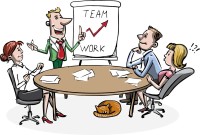- Home
- Business Processes
- Industry Knowledge
- Aerospace Industry
- Automotive Industry
- Banking Domain
- BFSI Industry
- Consumer/ FMCG Industry
- Chemicals Industry
- Engineering & Construction
- Energy Industry
- Education Domain
- Finance Domain
- Hospitality Domain
- Healthcare Industry
- Insurance Domain
- Retail Industry
- Travel and Tourism Domain
- Telecom Industry
- Leadership Skills
- eLearning
- Home
- Leadership
- Problem Solving
- Time Management Skills
Time Management Skills
How often do you have a plan for how you are going to spend your day but you aren't able to complete the tasks on your plan because of unimportant tasks, interruptions, or your own procrastination? Wouldn't it be great to be able to manage your schedule and your time while avoiding, or at least controlling, these time stealers? Learn the strategies to manage your schedule while still handling interruptions and demands on your time.
Meaning of Time
What time means to you and how to identify some of the ways in which you can manage it more effectively?
If you wish to become an effective manager of time you must first understand the nature of what you are attempting to manage. Time in this context is not to be defined philosophically. Most simply, it is of finite duration distinct from eternity. The expression 'time' in the English language as well as in other languages is used in different ways. Spend a few minutes writing down some ideas of what the following phrases mean to you:
- At the same time
- On-time
- Time off
- At times
- From time to time
- Timeless
- In no time
- Timely
- In time
A reflection on the above phrases will enable you to focus on the nuances of meaning that underpin their use in actual contexts. You have probably now got a clearer idea of time. Time in fact is an intangible concept or a paradox. You never have enough time but you have all the time that is available. It is a resource, but if you don't use it, it will disappear and you will never be able to catch hold of it, once gone. You can't increase its quantity, but you can ensure that you use it on things that are important to you.
You might have realized that time is a personal concept which means there is no right or wrong perception of time. Learning to manage time requires commitment and depends on how you approach various activities. Your approach will be influenced by the assumption you make about the nature of your work and the environment in which you live and work. Some assumptions will generally be more useful than others for managing your time effectively.
Meaning of Time Management
One of the most essential skills required by an effective manager and every professional relates to managing the time available and prioritize the long term and short-term goals.
Time management is a process of determining the quality and quantity of work output i.e. the effective utilization of time in performing various activities in the organization. Time management is the discipline of organizing, allocating, and controlling the time you use for activities in such a way that you achieve your desired results.
You as an employee have to perform your activities according to your job description. Your important duty is to see that all the activities are performed as per the job description and with the time limit assigned to the job. Time management will help you to perform your job more effectively and efficiently.
The flow of Time is Unidirectional
Like other resources, 'time' is also an important resource that has got a unique character of having a constant unidirectional forward flow. Time passed, cannot be regenerated nor it can be stored to be utilized later on when needed.
Adequate input of all other resources does not necessarily guarantee achievement up to expectation, if during the planning and implementing all possible efforts were not undertaken to complete the various component tasks in targeted time by effectively utilizing the same.
Why Time Management?
Time management is the discipline of organizing, allocating, and controlling the time you use for activities in such a way that you achieve your desired results. Time is a very valuable resource. The first step towards improving time utilization is to determine how available time is spent on different types of activities. Although managers understand that time is their scarcest resource, few actually take time to get a ‘birds-eye’ view of how they actually spend their time and keep a track of how the priorities they say are the most important fit with the actual way they spend their time. It highlights how to control your time so that you can optimize your productivity. Time management helps us to:
- To provide quality time to your responsibilities
- To decrease expenses through work transformation
- To see that all the staff spends their time as per the activities listed in their job description
- To measure the work output and facilitate quality customer focus
Time management is simply a way of using time effectively. Working faster or working longer are poor strategies for managing time. It is more sensible to identify your priorities and then choose the activities accordingly. In fact managing time is about managing yourself. It is about adapting to a given situation so that you can get the most out of your time for you to do this, you must accept that you can influence and ultimately control the environment in which you live and work. You must learn to spend your time wisely.
Related Links
You May Also Like
-
Teams are part of the modern organizational culture. Whether you are a team leader or a team member, having a better understanding of how teams work, and being able to identify where the team is in the process, is a critical part of ensuring the team is ultimately successful. Start with the basics and understand what a team is and what role they play in an organization.
-
Participative leadership is one of the most effective styles and creates higher productivity, better contributions from group members, and increased group morale. The democratic leadership style consists of the leader sharing the decision-making abilities with group members by promoting the interests of the group members. Learn more about this leadership style and situations when it is effective.
-
Benefits of Teams in Workplace
The use of formal work teams is commonplace in modern organizations. But why we have teams? What are the benefits or advantages that teams provide for organizations and employees? Do we really need to adopt formal team structures and use team-building approaches in organizations? Read this article to explore and learn the benefits of having formal teams in organizations.
-
In today's innovation-driven economy, understanding how to generate great ideas has become an urgent managerial priority. Managers need to encourage and champion ideas and need to help their organizations incorporate diverse perspectives, which spur creative insights and facilitate creative collaboration by harnessing new technologies. Innovation is the embodiment, combination, and/or synthesis of knowledge in original, relevant, valued new products, processes, or services.
-
Team Foundation in Forming Stage
This is the first stage of team development. This is the stage when the foundation of the team is laid. During the Forming stage, team members have a high dependence on their leader for guidance. Learn the practical strategies you can use during this stage to help your team develop into a highly effective performing team.
-
Collaborative leadership is all about collaborative problem-solving and decision-making or can also be defined as the leadership of a collaborative effort. . The term started to appear in the mid-1990s in response to the formation of long term public-private partnerships to rebuild public infrastructure. Learn how you can use principles of collaborative leadership to enhance your leadership skills for being an effective leader.
-
Building Perfect Creative Team
One misconception around creativity is that creative act is essentially solitary. Most of the world's important inventions resulted not from the work of one lone genius, but from collaboration of a team with complementary skills. Managers should build teams with the ideal mix of traits to form a creative group and then establish the conditions that make creativity much more likely to occur.
-
The development of teams is an ongoing process because the composition of the team may keep on changing. The new members may join and the old members may leave the team. The team members pass through several stages for the development of the team and there has been a lot of research to identify these stages. In this article, we discuss the common theories of team development.
-
How often do you have a plan for how you are going to spend your day but you aren't able to complete the tasks on your plan because of unimportant tasks, interruptions, or your own procrastination? Wouldn't it be great to be able to manage your schedule and your time while avoiding, or at least controlling, these time stealers? Learn the strategies to manage your schedule while still handling interruptions and demands on your time.
-
Have you ever noticed how we express ourselves or interact with each other? Have you ever wondered what communication is and what role it plays in our lives? One may wonder if communication is so omnipresent and integral to our lives, why study communication at all? We need to study communication because it is a complex process that consists of many elements and is also beset with a number of barriers and there is a need to remove the barriers so that the communication process is effective.
Explore Our Free Training Articles or
Sign Up to Start With Our eLearning Courses

About Us
Learning
© 2023 TechnoFunc, All Rights Reserved










